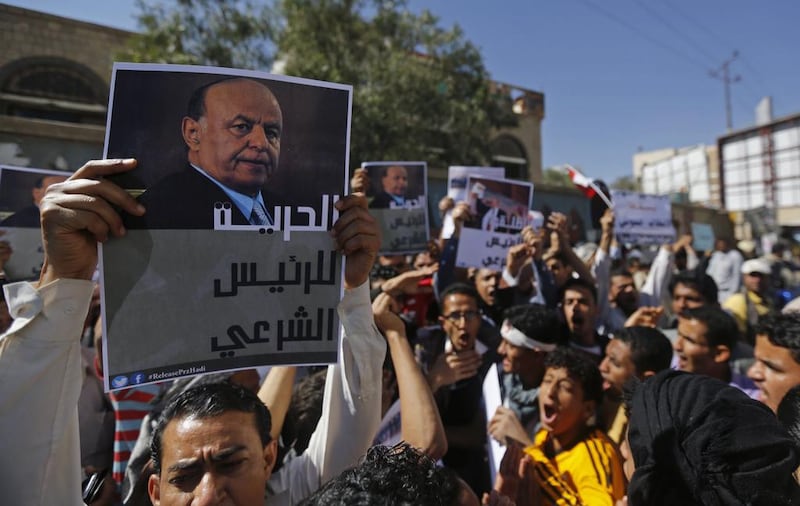ADEN // Yemen’s former president fled Sanaa on Saturday after three weeks under house arrest by Shiite militia, jeopardising UN-sponsored talks to fill the political vacuum.
Abdrabu Mansur Hadi arrived in the main southern city of Aden, where his supporters have refused to recognise the authority of the presidential council installed by the Houthi militia to replace him, his aide said.
Presidential guards managed to sneak Mr Hadi out of his residence in the capital “without an arrangement or even informing any of the political parties”, said the aide.
In his first public comments since fleeing house arrest, Mr Hadi on Saturday dismissed all measures taken by the Houthis since September 21 as “null and illegitimate”.
In a statement he signed as “president” – an apparent retraction of a previous offer to resign – Mr Hadi urged the international community to “reject the coup” by the militia.
Mr Hadi’s aide had earlier said that the president’s resignation last month was tendered under pressure from the Houthis who overran the capital unopposed in September.
Mr Hadi also called for a national commission to oversee the drafting of a new constitution making the republic a federation.
He said it should meet in Aden or Taez province until Sanaa “returns as a safe capital for all Yemenis, and the withdrawal of all armed militia”.
The president also urged civil and military institutions to “abide by the decisions of the constitutional authority and to protect it, including above all the armed forces and security forces”.
He demanded an end to the “house arrest” of prime minister Khalid Bahah and other officials in the capital, and urged Arab states and the UN Security Council to “protect the process in Yemen ... and not to legitimise the coup in any way”.
Earlier however, Abdulaziz bin Habtoor, the mayor of Aden who met Mr Hadi when he arrived, said the former president was “sticking to his resignation”.
Mr Hadi’s resignation did not receive the parliamentary approval required under the constitution before the Houthis unilaterally dissolved all government institutions on February 6.
Houthi gunmen at Mr Hadi’s residence were tricked into looting a vehicle carrying arms while Mr Hadi sneaked out of a back gate, said a source in the presidential force.
Last month, the Houthi militiamen – whose power base is in Yemen’s mainly Shiite northern highlands – seized the presidential palace and besieged Mr Hadi’s residence, prompting him to resign.
The Houthis have pushed their advance south and west of Sanaa into mainly Sunni areas, where they have met with fierce resistance from tribesmen and Al Qaeda militants.
But Taiz and some other parts of the north, and all of the south, remain beyond the militia’s control.
Mr Hadi is a southerner and most troops and militia in the area have pledged allegiance to him. His supporters hailed his arrival in the former southern capital as a game-changer.
Nadia Sakkaf, information minister in the government that resigned with Mr Hadi, called for the revision of UN proposals for a political settlement which special envoy Jamal Benomar hailed on Thursday as a “breakthrough”.
“The political situation and the balance of power has changed after the arrival of Hadi in Aden,” tweeted Ms Sakkaf. On Thursday, Mr Benomar said the parties had agreed on a new legislative authority to engage the Houthis and southern separatists in an “important step towards achieving a comprehensive political agreement that would end the current crisis”.
But Sanaa talks aimed at ironing out differences were suspended on Saturday because of “new developments”, the representative of youth groups to the talks, Bassem Al Hakimi, said.
“Hadi’s exit has turned the table on all parties, especially those involved in talks,” said political analyst Majed Al Modhaji.
*Agence France-Presse





